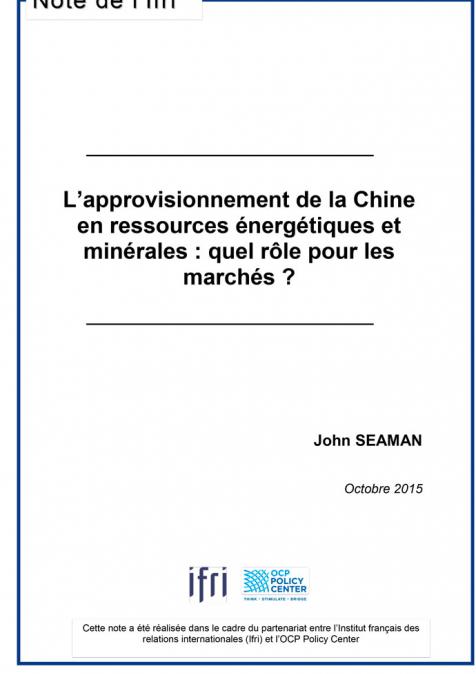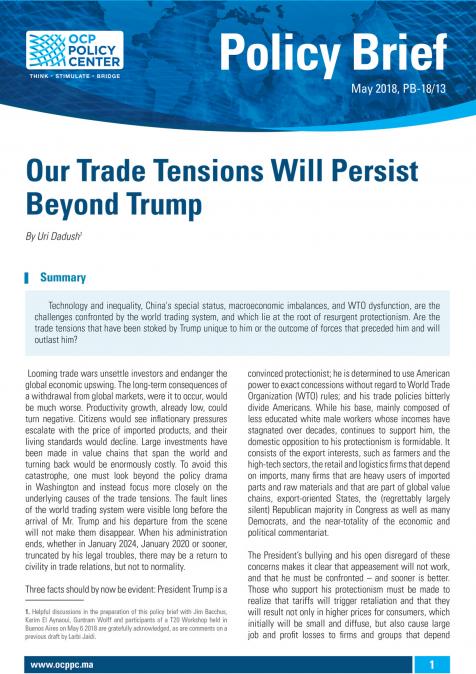Publications /
Policy Paper
Le présent article examine les efforts déployés par la Chine pour s’assurer l’accès à des ressources naturelles provenant de l’étranger en quantités toujours plus importantes. Dans sa quête de ressources nécessaires pour alimenter son économie, la Chine cherche-t-elle à encourager le développement des marchés internationaux ou plutôt à s’approvisionner en ressources de façon plus mercantiliste ?
L’attitude variable de la Chine sur un large éventail de marchés des ressources suggère qu’aujourd’hui, il n’y a pas de principes directeurs en amont qui détermineraient une approche homogène. Trois cas – le pétrole, le minerai de fer et les terres rares – illustrent autant d’approches différentes de la Chine concernant l’approvisionnement en ressources et leur allocation. Dans le cas du pétrole, au cours des dix dernières années, la Chine a montré qu’elle respectait de plus en plus les principes de marché. Dans le même temps, pour ce qui est du minerai de fer, la stratégie mise en oeuvre par la Chine pour acquérir une position de force dans les négociations au sein d’un système fermé préexistant a été mise à mal par son incapacité à contrôler ses propres acteurs sur le marché.
Cela a débouché sur l’ouverture d’un marché plus flexible. Enfin, le cas des terres rares est un bon exemple de l’approche qu’adopte la Chine lorsque cette dernière contrôle la production mondiale (bien que celle-ci se concentre à l’intérieur de ses frontières). Dans le commerce des terres rares, la Chine est prête à enfreindre les principes du marché, que ce soit pour obtenir des avantages sur le plan diplomatique ou pour encourager des transferts de technologie étrangère vers la Chine. Cependant, elle a également montré qu’elle n’était pas disposée à sacrifier sa participation au système de règles internationales en matière d’échanges au sens large telles que formulées par l’Organisation mondiale du commerce (OMC). Enfin, bien que les besoins grandissants de la Chine en matières premières importées représentent sans aucun doute un certain nombre de défis, les préoccupations que l’on nourrit à l’égard de la Chine sont souvent exagérées ou ne tiennent pas compte de la manière dont les entreprises chinoises ont désormais tendance à mener leurs activités à l’étranger. Ainsi les craintes vis-à-vis du « mercantilisme » chinois sont tempérées par le fait qu’en pratique, les entreprises chinoises ont davantage contribué à renforcer et même à améliorer les mécanismes de marché internationaux en matière d’échanges de ressources qu’à les remettre en question. En Chine, le scepticisme à l’égard des principes de marchés internationaux semble avoir diminué avec le temps. Les dirigeants, les stratèges et les entreprises chinoises semblent être de plus en plus convaincus du rôle majeur que jouent les marchés pour garantir un certain niveau de sécurité des approvisionnements en ressources pour le pays.
Cependant, la complexité des relations entre les entreprises d’État chinoises, les politiques gouvernementales et les instances dirigeantes du Parti communiste contribue à brouiller les frontières entre stratégie du secteur privé et stratégie nationale. Il s’agit là d’un domaine qu’il faudra continuer à surveiller à mesure que le poids de la Chine dans les affaires du monde s’accroît et se transforme.





